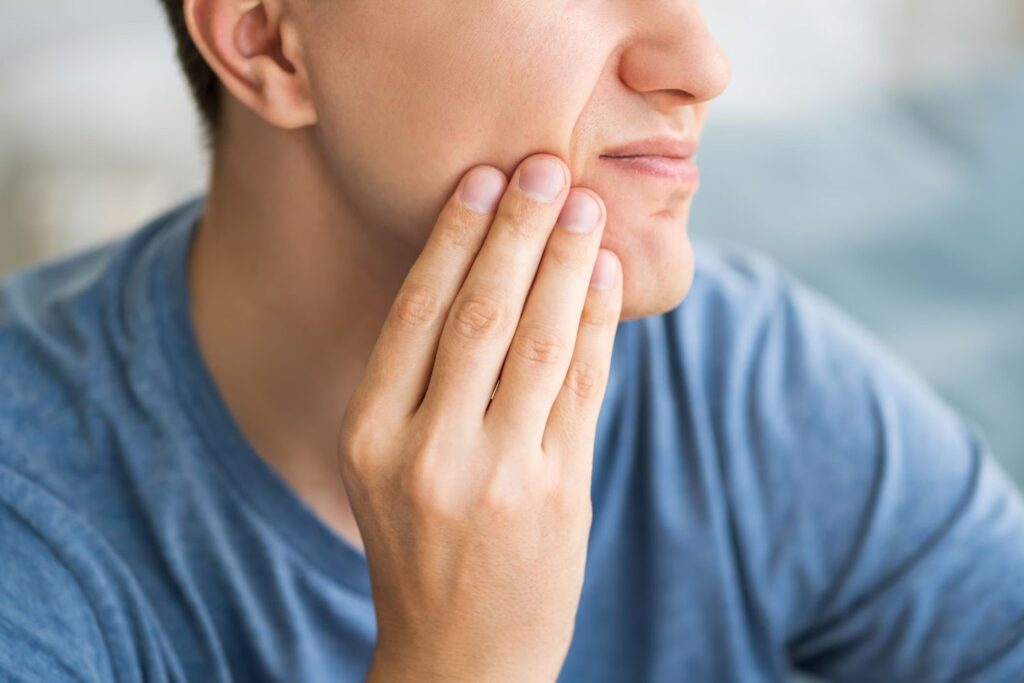From biting into ice-cold ice cream to sipping on a hot mug of tea, your teeth come in contact with extreme temperature changes throughout the day more than you might realize. If you’re like many people who suffer from sensitive teeth, these sudden temperature changes can mean an unexpected burst of discomfort and even pain. During cold weather, more people complain of sensitive teeth than at any other time of the year. But what exactly causes sensitive teeth, and what can you do about it? Read on to find out all this and more.
Why does the cold make your teeth feel more sensitive?
During the colder months, dentists generally see an uptick in patients complaining of sensitive teeth. In fact, the prevalence of teeth sensitivity is so common that dentists have created a scale known as the Schiff Cold Air Sensitivity Scale to determine how uncomfortable a patient’s tooth sensitivity is.
Some dentists might even go as far as recreating cold atmospheres using cold bursts of air to determine how sensitive your teeth are when exposed to lower temperatures. When the dentist is able to help determine why cold air is the culprit behind your sensitive teeth, you’re more likely to find a remedy that helps reduce if not remove the pain altogether.
Reasons for Sensitive Teeth
So, why are my teeth sensitive all of a sudden? Unsurprisingly, there are many reasons than just one as to why your teeth might be more sensitive during the colder months. Even individuals who have the best oral health can suffer from sensitive teeth. When you’re able to determine what is causing your sensitive teeth during cold weather, you’re more able to take intentional steps to prevent sensitivity from occurring.
Sometimes, you can narrow down the reason yourself, but it’s recommended to seek dental care from an experienced dentist in order to get a thorough assessment of your oral health.
Let’s take a look at some of the more common reasons why individuals might find themselves facing sensitive teeth during colder temperatures.
Sudden Temperature Changes
Going from mild temperatures to suddenly frigid temperatures can cause hot or cold sensitivity because of the contraction and expansion of your tooth’s dentin. Your tooth’s dentin sits just above your tooth’s pulp and just under the protective enamel. When faced with stress, the dentin reacts quickly and can result in the sensation of pain. During cold weather, sudden expansion and contraction of the dentin layer can happen because of microscopic fractures or cracks in your tooth enamel.
Exposed Dentin
The dentin is the middle layer of your tooth’s structure. Because it is located just above the tooth’s pulp (where pain receptors are located), you are more likely to feel tooth pain, including sensitivity, when the dentin is put under stress. The dentin can experience aggravation due to receding gum lines that expose the dentin, cracks and fractures on the enamel, and cavities or chipped teeth that expose the dentin.
Underlying Oral Health Issues
Oral health issues, including gingivitis and periodontal disease, can lead to the weakening of your gum line and can result in gum inflammation and/or recession. When this occurs, your receding gum line can expose the root of your teeth — including the dentin — making you more susceptible to teeth sensitivity.
Cavities and cracked teeth can also result in tooth sensitivity because the build-up of bacteria can cause inflammation of your tooth’s pulp. When the overall health of the tooth is in decline, one of the more common symptoms you’ll face is teeth sensitivity and overall tooth pain.
Brushing Too Vigorously
Brushing too hard with a toothbrush that has rough bristles can wear down your tooth enamel and create microscopic cracks and fractures. Brushing too hard can also accelerate gum recession which will then expose the root of your teeth. This exposure can be the cause of tooth sensitivity during extreme temperature changes.
Teeth Whitening Agents and Sensitivity
Teeth whitening agents, including toothpaste with elevated levels of teeth whitening chemicals and teeth whitening strips, are one of the biggest culprits of teeth sensitivity. Harsh chemicals such as carbamide peroxide and hydrogen peroxide can permeate the hard tissue on your teeth and lead to the degradation of your enamel over an extended period of time. Loss of enamel can leave your teeth feeling overly sensitive even if you are not exposing your teeth to cold or hot temperatures.
Because teeth whitening agents are a common culprit for teeth sensitivity, if you already suffer from sensitive teeth after using teeth whitening agents, colder weather can exacerbate this sensitivity. Ask your dentist about ways to whiten teeth without pain or sensitivity.
Acidic Drinks and Tooth Sensitivity
If you are always left wondering, “Why does my tooth hurt when I drink something cold,” it’s likely because of this contracting dentin. Acidic drinks, including tea, coffee, and sugary beverages, can erode your tooth enamel much more quickly than usual. As your tooth enamel erodes, so will your threshold for sensitivity. As the dentin on your teeth becomes exposed, you’re more likely to feel teeth sensitivity during colder temperatures.
Consider Your Lifestyle Habits
Other lifestyle habits, including using nicotine, chewing tobacco, and having a high-sugar diet, can also contribute to the decline of your oral health. When your oral health declines, one of the first things you’ll notice is tooth sensitivity.
How to Keep Your Teeth Feeling Less Sensitive During the Cold
You have several options regarding how to fix sensitive teeth. If you’re able to narrow down what is causing your tooth sensitivity during the cold, then you can take the appropriate steps to remedy your teeth sensitivity.
For example, if your teeth whitening treatments are causing you to experience more sensitivity than normal, it’s in your best interest to stop the treatments during colder weather. Additionally, teeth sensitivity caused by gingivitis, periodontal disease, or even cavities might mean that you need to visit your dentist sooner and get on an appropriate treatment plan.
There are some things you can do right away to help alleviate some of the sensitivity you feel during the cold. All of these home remedies for sensitive teeth involve enhancing your oral hygiene habits so that you have the best oral health possible. Throughout the year, and especially during the winter months, try to incorporate the following into your oral hygiene routine.
- Brush with a soft bristle brush as opposed to a hard bristle brush. If you use an electric toothbrush, you might find switching to a soft-bristled manual brush serves you better.
- Don’t brush too vigorously. Instead, try using a vertical orientation and target each tooth individually. Brushing softly helps to keep from putting too much stress on your gums.
- Floss regularly to remove excess food and bacteria from between your teeth.
- Put a pause on using abrasive toothpaste, including ones that are marketed to remove stains or offer advanced whitening. Instead, use a non-abrasive toothpaste that does not contain ingredients like aluminum oxide or calcium pyrophosphate. Be sure to continue using an anti-cavity toothpaste as well. Speak with your dentist about finding an appropriate toothpaste for your oral health.
- If you naturally have sensitive teeth, speak with your dentist about different toothpaste options made specifically for sensitive teeth.
- If you grind your teeth at night, using a mouthguard is a great way to help keep your teeth protected from unintentional damage.
- Avoid eating foods that increase sensitivity. This includes overly hot or cold beverages, fruit juices, soft drinks, and other acidic foods and drinks. Using a straw can help keep sugary and acidic drinks from touching your teeth if you need or choose to consume them.
- Finally, if you need to go out into the cold, consider using a scarf and covering your mouth to keep the cold air from directly hitting your teeth.
Common Fixes for Sensitive Teeth During Cold Weather
In addition to practicing good oral hygiene habits, there are additional steps you can take to help alleviate your sensitive teeth. Ask your dentist about any of the following treatments regarding your teeth sensitivity.
Undergoing a Fluoride Treatment
Cavities can help fuel infections which lead to tooth pain and tooth sensitivity. One of the best treatments to fight against cavities is a fluoride application. A fluoride solution is applied directly to your teeth and left on for a couple of minutes. The fluoride will help to strengthen your overall tooth health so that bacteria build up and infections become less prevalent. In addition to undergoing fluoride treatment, it’s important to continue implementing good hygiene habits.
Covering Root Surfaces
Ask your dentist about covering up root surfaces to protect the vulnerable parts of your teeth, including exposed dentin from receding gums. Covering root surfaces and undergoing dental sealants can help protect against sudden sensitivity after a cold blast of air.
Schedule a Root Canal Treatment
If you’re suffering from continued tooth pain and tooth sensitivity due to trauma, tooth decay, or cavities, a root canal can be a good solution. A root canal will dig out the nerve of the tooth so that you do not feel pain and sensitivity. Often, a crown is placed after the root canal to help strengthen the tooth because a tooth can become more vulnerable to breaking after a root canal.
Before you turn to dental measures like root canals, it can help to try out different toothache home remedies that can alleviate the pain and even reverse minor damage caused to your tooth’s protective enamel.


Regular Price:
$179
With this offer, there’s no excuse not to get back on track! Schedule a complete exam and x-rays for only $39 and ensure you have a beautiful healthy smile.
Speak With Your Dentist About Teeth Sensitivity
If you suffer from sensitive teeth during cold weather, speaking with your dentist can be the best way to determine why. Once you’ve narrowed down the cause of the tooth sensitivity, you can move forward with a plan of action to help reduce the sensitivity.
At Absolute Dental, our experienced team of dental hygienists, dentists, and specialists will help you narrow down why your teeth are sensitive to cold. Trust our team to develop a comprehensive oral health plan so that you can get back to enjoying life, no matter the weather.
Do you have sensitive teeth? Contact Absolute Dental to book your appointment today.
Sources:
Abuzinadah, S. (2021). A randomized clinical trial of dentin hypersensitivity reduction over one month after a single topical application of comparable materials
The Anatomy of a Tooth. (2023).


